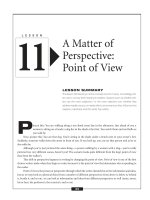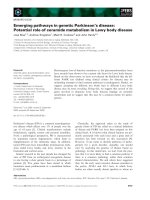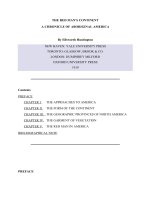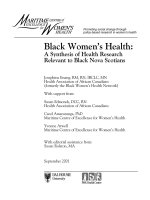Reflectivity in Yu Hua’s novels – a point of view from an individual life
Bạn đang xem bản rút gọn của tài liệu. Xem và tải ngay bản đầy đủ của tài liệu tại đây (322.25 KB, 8 trang )
TRƯỜNG ĐẠI HỌC SƯ PHẠM TP HỒ CHÍ MINH
TẠP CHÍ KHOA HỌC
HO CHI MINH CITY UNIVERSITY OF EDUCATION
JOURNAL OF SCIENCE
KHOA HỌC XÃ HỘI VÀ NHÂN VĂN
SOCIAL SCIENCES AND HUMANITIES
ISSN:
1859-3100 Tập 16, Số 7 (2019): 88-95
Vol. 16, No. 7 (2019): 88-95
Email: ; Website:
Research Article
REFLECTIVITY IN YU HUA’S NOVELS
– A POINTq OF VIEW FROM AN INDIVIDUAL LIFE
Nguyen Thi Tinh Thy
Literature Department – University of Education, Hue University
Corresponding author: Nguyen Thi Tinh Thy – Email:
Received: February 08, 2019; Revised: March 16, 2019; Accepted: April 10, 2019
ABSTRACT
Among the novels by Chinese writer Yu Hua, individual life is not simply an individual
challenge but, through his works, he also implied several issues of life in a whole society. With a
straightforward and harsh reflective viewpoint, Yu Hua constructed an intermixed reflection with
different forms:living reflection, human characteristic reflection, nationalistic reflection, realistic
reflection, philosophical reflection... His reflection helped the readers “re-thinking the past”, turning
up the old history’s pages full of blood and tears as a debt for both the writer and the readers to pay
back at this present time.
Keywords: Yu Hua, novel, reflection, individual life.
1.
Introduction
Yu Hua is the leader of the Chinese pioneering novel series with works that shocked
readers such as Screaming in the rain, Live, Hua Tam Quan’s selling blood story, Brothers.
The novels have shown the distinctive features of Yu Hua through the post-modern sense of
composition. That feeling dominates all artistic elements, in which, personal life is the most
painful, sore and the most haunting problem.
Personal life in Yu Hua's novels is physical and mental “trauma”. These are the lives
that are deprived of the minimum physical needs, must live with violence and the complexes
of confusion and obsession. However, personal life is not merely a matter of the individual,
but through this, he implied many problems of society with the straightforward and harsh
reflective viewpoint. His novel is a general reflection in many different forms: human
investment, humanity, nationalist reaction, realistic reflection, philosophical reflection...
leading to. Awakeness for readers today about the paradoxes, instability, disguise of
contemporary China.
2.
Content
Reflection is a philosophical term that implies reflection, response, re-thinking, review,
suspicion... conclusions in history. “Reflection means reflecting and examining cognitive
behaviors” (Philosophical dictionary, 1986, p. 430). The reflection in Chinese novels
associated with the “wound” trend is the self-criticism of the writers and critics of old values.
In that source of inspiration, writer Yu Hua has reflected on great issues through personal life.
Cite this article as: Nguyen Thi Tinh Thy (2019). Reflectivity in Yu Hua’s novels – A point of view
from an individual life. Ho Chi Minh City University of Education Journal of Science, 16(7), 88-95.
88
Tạp chí Khoa học Trường ĐHSP TPHCM
Nguyen Thi Tinh Thy
2.1. Human life reflectivity: “the injured ego”
During the years of the Koumintang – Communist Civil War until the revolutions of the
Chinese since the twentieth century, the characters of Yu Hua have become “the injured self”.
For those people, life is suffering jouney day by day, people must miserably live from
destitution, starvation, torment, resentment, suffering, humiliation, violence and death.
Therefore, the main character's injury is Yu Hua's reactionary voice about human life.
Hunger, piece of food, place to live and to die is always an obsession for the character
in Screaming in the dust, Live, Hua Tam Quan’s selling blood story, Brothers. Kho Can
(Live) death by “a full meal”. The food is the desire of the Hua Tam Quan family (Hua Tam
Quan's story to sell blood) and the brothers Ly Troc (Brothers). The meal in Ton Quang
Lam's family (Screaming in the rain) is the affliction for adults and the fear of children. The
war between the father and the son Ton Huu Nguyen - Ton Quang Tai because the piece of
food is a rare battle of heroes. “Two reckless opponents” are fighting with each other with
many hard hits, ready to knock out the opponent to emd the game because of piece of rice.
Ton Quang Tai likes to “teach” his father during meals. In his son's scolding, Ton Huu
Nguyen “bowed his head in fear, but did not affect his eating speed”.
“It was not until the bowl of chopsticks on his hand was lost, he was forced to stop”, but
“the eyes kept staring at rice and food on the tray” (Yu Hua, 2008, p. 232). Hunger has made
people corrupt, immoral, inhumane and unfaithful. In the father and son, It can not be
determined who is more miserable. Yu Hua spent reams of paper to describe the war of father
and son. Through that war, the difficulties and suffering of human life, the humiliation of life
are exposed nakedly. Hunger happens just only in a part of life but its sequence are deeply
ingrained throughout the lives of the characters, influencing their character and destiny
Physical violence, mental violence, physical violence, body violence... are the obsession
of many people who must live in a turbulent period of China's revolutionary history. Feeling
abandoned, lonely, guilty and fear; obsessed with starvation, gore, violence and death,
surrounded by Yu Hua's characters from birth until after death.
Just being denied by reality and denying reality, Yu Hua's characters became lonely.
They were alone due to fate, due to circumstances, and also because they wanted to run away
from this world. Every lonely person in Yu Hua's novel was “a cold planet”, some lonely
elements were divided only by themselves: closed - isolated - stuck - suffering. Loneliness as
a vortex of fate engulfed them in the sadness, compassion.
The feeling of guilt and fear is a seriouly mental trauma for those characters as well.
Ton Quang Lam and To Vu (Screaming in the rain) has a dark life of soul with frustration
and sexual guilt. The smutty behaviours of husband and son made Ly Lan (Brothers) run
away in disgrace as a sin; regret and self disgust made Ly Troc and Lam Hong made their
love become hatred each other. All of them had to suffer sorrow with seriously spiritual
punishment, which is more painful than the dealth.
Physical and mental injuries caused all characters in Yu Hua's novels to fall into a state
of suffering, anger and depression in their lives. “People live the miserable, disgraceful,
painful and sad lives. I feel sorry with that” (No king - Nguyen Huy Thiep). Each “trauma”
89
Tạp chí Khoa học Trường ĐHSP TPHCM
Tập 16, Số 7 (2019): 88-95
contained a lot of feelings about life Because, behind personal life is also humanity, national
life and historical truth with “Chinese reality” especially with Chinese style.
2.2. Humanity reflectivity: “the father-killing culture” and the collapse of “great
narratives”
“The father-killing culture” is a recent phenomenon in Chinese literature and arts (Teng
Fang, 2012). It is a way of expressing skepticism, denying some old values that once froze in
Chinese people's perception. Especially the father image - symbolizing for centralized power,
the unique and highest position; and family values - symbolizing for social and inherent order.
In Yu Hua's novel, many “great narratives” with traditional values such as family
morality, social morality, human values... are overthrown, causing the rise of killing father
“phenomenon”.
Many children in Yu Hua's novels are very painful because of the brutality and evil of
their father. The father in their eyes are all “Dead Fathers” like in the novel of American
writer Donald Barthelme. Those are dead fathers, who died or should die in their hearts
because they do not deserve to live, should not live. Ton Quang Tai (Screaming in the rain)
cruelly acted with his father, had an affair with the widow, molested his daughter-in-law
twice, torture his wife and children, stole and swore... One night, when he was drunk. he fell
into the feces hole of the village. “He buried himself in the fitlthiest place”, the body “floated
in this hole, white maggots crawled full of his boday” (Yu Hua, 2008, p. 93).
Observing the life of Ton Quang Tai, he can be seen as an immoral person. It was
disgraceful from his thoughts, his words to his actions, from his way of living to the way of
death. However, the culmination of the “father-killing culture” in Yu Hua's novels is in Ly
Son Phong's image in the Brothers. Always bowing his head to spy on the woman’s ass, Ly
Son Phong fell into the feces hole and drowned in the dirty hole, leaving the humiliation for
his wife and children. According to Ly Troc - his son, that was a unique death, a fearful and
risky death. Why does he say risk? Because “those years, a lot of men spied on a woman's ass
in a barn, a lot of men still lived peacefully” (Yu Hua, 2012, p. 31). We need to pay attention
to the phrase “a lot of” here. It is this phrase that inculcates the “father-killing culture” in the
Brothers in particular and all Yu Hua’s novels of. The disease that Ly Troc's father suffered
was an era. A lot of men carry the disease, have such evil stealth actions. It also means that
many men deserve to die, they no longer deserve to be the pillars of the family and society.
The image of “Dead Father” appears a lot in contemporary literature. In addition to the
novels of Yu Hua and Donald Barthelme, we also found fathers in Lolita of Vladimir
Nabokov, Instinct of Mitsuyo Kakuta, The Republic of Wine of Mo Yan, The Rose Gate of
Tie Ning, The Boat to Redemption of Su Tong, No king of Nguyen Huy Thiep... Those are
fathers of postmodern literature. Accordin to Thuy in Retired Generalby Nguyen Huy Thiep,
these fathers have caused the “flag disorder”. “Flag disorder” is a state of distraction disorder
with no standard values and no spiritual fulcrum. Nietzsche said: “God is dead”. “People do
not want to / cannot reorganize the world” (Hoang Dang Khoa, 2011). Yu Hua's novels are no
exception. In addition, in the wave of breaking the ideological and old-fashioned ways, Yu
Hua still expressed a personal imprint obtained from the personal mind and community
consciousness with the characteristics of history - society that he has been experiencing.
90
Tạp chí Khoa học Trường ĐHSP TPHCM
Nguyen Thi Tinh Thy
Besides the basic features of the postmodern spirit, there was a dramatic reversal in the
concept of Yu Hua when expressing “father-killing culture”. The father represents the solemn,
exemplary, and the cultural and spiritual sustainability of the Chinese. On the other hand, the
father in Chinese culture also symbolizes patriarchy, monopoly, dictatorship, totalitarianism.
And in the family as well as the society of Yu Hua’s novels, there are more bad fathers than
the good fathers, they are being more despired than respected. The spiritual value of society is
being overturned, order is reversed. Standard deviation, loss of faith, chaos are the
characteristics of postmodern consciousness that dominate the spirit of novels through the
image of these Chinese “Dead Fathers”.
“The father-killing culture” represents the spiritual tragedy of the young generation and
the sad reality of contemporary China when the values of family and humanity such as great
narratives are gradually eroded, and collapsed. At the same time, through this type of image,
we also see the “disbelief” attitude of the writer in this period - history associated with the
authoritarian and willful will of Mao Zedong.
2.3. Nationality reflectivity: from the “death of the subject” to the death of the
community
The subject “ego” was being particularly concerned among many human - right and
literacy revolutions. With reflection inspiration, contemporary Chinese literature also
mentioned “ego”. But it was a suffocating “ego”, mixed with “us”. It was deprived all, even
basic rights and needs. After all, those “egos” has died both physically and mentally – “the
death of their own”.
In terms of both material and spiritual, words and actions, life and death, the people in
the novels of Yu Hua were erased from the “ego”. Subjects are disabled, paralyzed. The
subject is dead, because the “ego” of person does not live by its personality and true nature,
but is created by the imaginary images and imitation. The “death of the subject” is a
consequence of “social hypertrophy”. People kill the subject to honor the so-called collective.
But in the Yu Hua novels, in fact, the collective also died, and they transformed into crowd.
The crowd is the traditional product of Chinese culture and literature combined with the
bankruptcy of modern collective politics and economy.
In the early twentieth century, in Lu Xun's work, the foolish crowd, compromised,
rejoiced in the suffering of others and relied on spiritual victory to lull themselves to sleep
with false victories. has become a typical character type. After the reformation (1978), the
image of the crowd continued to be reborn in the works of many other writers, especially the
works of the “wounded” and “reflective” novels. The crowd formed ruthless revolutionary
waves that submerged individual lives, not liberating individuals as its message. This type of
character symbolized the way of reviewing the writers' history, recognizing a period that
always raised voice for people but buried people, because they are collective but in fact they
just took the title of the collective to gain personal benefits.
In Yu Hua 's novel, the crowd is no longer fuzzy, they were not only the backdrop for
the historical stage as in the novels of other writers, but they more clearly existed. They had
voices, laugters, actions and point of view... but all just to once more inculcate the mental and
91
Tạp chí Khoa học Trường ĐHSP TPHCM
Tập 16, Số 7 (2019): 88-95
personality weaknesses of the Chinese people that Lu Xun used to revealed in the harsh and
painful ways in his compositions.
In Yu Hua’s novels, the crowd liked to gossip, spread rumours and imitate others.
Therefore, they were very easily manipulated, quickly becoming revolutionary masses. They
“often went aroundthe street, sometimes they shouted slogans, followed the parod, sometimes
they didn’t know what to do, they leaned on the tree and kept yawning continuously” (Yu
Hua, 2012, p. 108). “The crowd never asked for the truth. Facing the obvious things, the
crowd was not satisfied, they turned away, they liked to sanctify mistakes, if the mistake
could appeal them. Those who knew how to create illusions for the crowd would easily be
their boss; those whowas going to break the illusion of the crowd, would be their victim”
(Gustave Le Bon, 2009, p. 169). How to be successful with the revolutions in which the force
were people who had no strenght, no souls and no political opinions, and “likes deifying
mistakes” like that. Le Bon was reasonable when he remarked: “Until now, civilizations were
only created and led by a small group of intellectual aristocrats, not by crowds. The crowd
only has the power to sabotage. The domination of the crowd always represents a savage
period” (Gustave Le Bon, 2009, p. 34).
Contemporary Chinese history often emphasized the role of the crowd as a
revolutionary mass, a collective; believed in collective strength, collective consciousness and
the correctness of the collective path. According to many people, the collective became the
decisive factor of the revolutionary path. However, the collective of China was a crowd of
people with many traditional spiritual disadvantages , which were easily excited and
exploited. They could not take over the national responsibilities. They were a combination of
subjects who have died without daring to do anything , they could not live with their egos, and
they will cause more “deaths” when standing in the crowd.
Collectiveism is essentially a new way to call “hypertrophy”, it is a fabrication of
community - ethnicity. And, when “collective” - that crowd is a collection of lonely people
trying to accept the repression of the revolution with many different forms and situations, they
have made “colletive death”. That death is the wrath of the writer in front of the discounrse
that manipulated the values of the collective which has occupied in the spiritual life of modern
Chinese people for a long time.
2.4. Reality reflectivity: revealing the “social body”
Every unhappiness and tragedy of Yu Hua characters was a color that created a realistic
picture. Phu Quy's mourning life, melancholy of Ton Quang Lam, the misfortune of Song
Pham Binh, the ridiculousness of Ly Troc, irony of Tong Cuong, hardship of Hua Tam
Quan... recreated a “social body” China in the twentieth century was full of hunger, violence,
death, deception and mischief.
Wanting to sell blood, Hua Tam Quan and others in the same situation had to bribe Mr.
Li, head of the hospital's blood supply department. Mr. Li is the “ruler of the blood” in their
bodies. “Allowing someone to sell blood or not allowing someone to sell blood, completely
based on his decision” (Yu Hua, 2006, p. 35). What does he reply on to make decision? The
health of the blood seller? Or the quality of blood? No! He relied on how they were closed
with each other. How was closed?... There were a watermelon, chicken egg, pork, sugar, or
money (Yu Hua, 2006, p. 36).
92
Tạp chí Khoa học Trường ĐHSP TPHCM
Nguyen Thi Tinh Thy
Selling blood is “selling ancestors”, which is the harshway to make money, but to do
this, “miserable people” must extract blood first for state officials. Exposing the real side of a
society that is supposed to be superior, for humanity, “for the people to serve” was not only
seen in Yu Hua's compositions. The problem here was how to expose that reality. Yu Hua has
chosen a thorny writing style, a way of exposing real pain when putting all the injustices and
cruelties of social institutions into the “blood” image and the act of trading blood. Looking
back on the past, assessing the realism in a unique, and harsh way was a brave action in the
Yu Hua’s journey of creating art.
One of the causes of trauma the characters’s lives in the Brothers, Screaming in the rain
was ambition. The difference between the two periods before and after the reform was actually
to suppress and release the ambition: forbidding sex or having sex. Prohibitting sex in Yu Hua's
novels was the action of killing the “ego”. People could not live with their own freedom, which
was the most instinctive and humanly thing that people have. Therefore, during the revolution,
Father Ly Troc and many men of Luu town secretly spied on the woman's ass in the toilet; Ton
Quang Tai, Ton Quang Binh, Dr. To and most of the men in the village had affairs wth widows
(Screaming in the rain). But after the reform in the Brothers, Ly Troc could openly sleep with
many beautiful girls in front ofeveryone's admiration; Chu Du can stand to sell artificial hymen
on the street; hospitals and beauty salons can advertise hymen patch technology everywhere;
Lam Hong may be famous for being the hostess of the “red light district”; the wife of the
blacksmith was admired for granting permission to her husband to sleep with prostitutes on
New Year holidays; and Dong himself blacksmith was conferred as “Tet holiday” because he
memorized the holidays that his wife gave him to sleep with beautiful girls.
All the harsh and unruly, ridiculous and mischievous things were evidences and also a
consequence of two tough periods in modern Chinese history. One “era of passionate spirit,
repressed instincts and extremely catastrophic fates, which was no different from medieval
times in Europe...; a crazy, impatient, and fast-paced period that people all displayed much
more than e than the present of Europe” (Yu Hua, 2012, p. cover 4). Through the desire of the
individual, we can realize the desire of society. The prohibition of sex during the
revolutionary period and the indulgence of the open reforms caused people to fall into the
same alienation, loss and sin. Whether repressing desire or pursuing desire, releasing desire,
the outcome was equally unfortunate. It was the most personal issue, but also the most
common onec. Thus, the real world sometimes has the ability to emerge from a little painful
dot of human life.
Burdened by the brutality of history, the doctrines of political ideals were no longer
meaningful to the characters. Their common ideal was money, which became a “hypertrophy”
element of reality. There was a character who established his value by money, there was also
a character who lost value because of money. From the ironic way that Yu Hua used to
express the characters’ tragic lives, we could see Yu Hua was looking at the country’s reality
directly from insignificant people through inspriration of life. Each private life is unique but
contains the common thing, that is, history.
“Selling the ancestors”, “killing the father”, sinking deeply into the desire of money
guiltily and painfully characters in Yu Hua’s novel were lonely in life. Analyzing the mental
traumas of the characters, the “hypertrophy” of reality, the readers can recognize the author's
93
Tạp chí Khoa học Trường ĐHSP TPHCM
Tập 16, Số 7 (2019): 88-95
reflective spirit. And that reaction /reflection revealed the “social body”, thickening the
significance levels of the work.
2.5. Philosophical reflectivity: “inside randomness exists no inevitability”
War, politics, and party are important issues for each nation, and of course it is also
important for each individual. However, the participation of the people in Yu Hua's novels
sometimes was random, and even under coercion. Phú Quý (Live) was taken to the army by
accident while going to the street to find a healer for his mother, it was so unexpected that he
has not informed his family yet. Phu Quy's comrades also participated in civil war passively,
or being forced. Some huge things like ideals, parties... were far away, and unfamiliar to
them. They were forced to accept the reality,so they could not control the reality . This was
even more obvious in the subsequent revolutions in China.
Xuan Sinh (Live) follows the liberation army. The revolutionary career was successful,
his personal career also rose like a kite in the wind. But then the Cultural Revolution erupted,
he was reconsidered, prosecuted , beaten so badly that he jumped into the well to suicide. And
so did Hua Tam Quan , suddenly Hua Tam Quan became a smith in the “Dai Nhay Vot”
renovation. Suddenly, all his family had to go to eat in the cafeteria. Suddenly, the collective
restaurants were closed, people were in hunger. Suddenly,the school store was closed, all
activities had to be stopped for the Cultural Revolution... Just like that, people did not
understand what they could or could not do, although all the things were for revolution.
All their ups and downs in life were very similar to those of Lo Thi mother in Big
Breasts & Wide Hips, Tay Mon Nao in Life and Death Are Wearing Me Out of Mo Yan, Xao
Xao in The Cloudless Thousand Mile of Li Rui. They were forced to accept all the historical
events, political schools that fell on their lives without being able to choose. History has
“raped” the identity of the people, and they cannot resist. It was a reality of history - reality
was seen from personal life. It was full of irony, absurdity and cruelty by trampling on
personal freedom and fabrication of what is called personal freedom.
From the reflection, the ups and downs, the loss of each human being in the novels of Yu
Hua depended not only on history, but also on more mysterious, powerful power. That was
destiny. The characters in Screaming in the rain, Hua Tam Quan's selling blood story, Live and
Brothers were faced with the cruelty of life by the arbitrary and randomness of fate. From the
reflection on the relationship between history and personal life, Yu Hua expressed a new
concept of history from the indeterminist view of the world. That reflection is a testament to the
“poverty of discourse” (Karl R. Popper, 2012, p. 1). Because, not only there was the oppression,
there was the fight, there was but also the oppression to hold a gun, to fight; not only the
personality can decide the fate, but the destiny can decide the fate as well; not only “in the
random” has “hiding the necessity” (Mark, Phangghen (episode II), 1971, p. 473); but the
random can still exist purely and does not show the necessity “With postmodernism, behind the
phenomenon there was no nature, there was no neccessity inside...” (Phuong Luu, 2011, p. 63).
3.
Conclusion
Reflection is a strong artistic and political movement in China after innovation. In the
field of literature, reflection became one of the four mainstream lines of contemporary fiction.
If the writers Wang Meng, Gu Hua, Wang Anyi, Zhang Wei, Chen Zhongshi, Mo Yan, Tie
Ning, Yan Lianke... swept into each wound related to personal misfortune, bureaucracy,
94
Tạp chí Khoa học Trường ĐHSP TPHCM
Nguyen Thi Tinh Thy
historical and social tragedy, Yu Hua embraced the whole state and spirit of contemporary
Chinese history, looking for the profound origin of the “wound” of the age of architecture, not
just. From personal life, it can be seen that Yu Hua took the spirit of individuality to be the
basis for rebuilding the true world, taking personal life as a way to realize the world. The
effect of this postmodern way of thinking is the “realization of reality” with a “truly realistic”
picture. It was a Chinese-style reality with the writer's reflective spirit. Reflection helps
readers “rethink the past”, turn back the old and bloody history page as a debt to pay by
writers and readers today.
Conflict of Interest: Author have no conflict of interest to declare.
REFERENCES
Bon, Gustave Le. (Nguyen Xuan Khanh trans.) (2009), The Crowd: A Study of the Popular Mind. Tri
Thuc Publishing House.
Hoang Dang Khoa. (2011). (11/05/2019). Analysing the short story “Without the king” of Nguyen
Huy Thiep. Retrieved from />K. Marx, F. Engels. (1971). Collection, II. Su That Publishing House.
Phuong Luu (2011). Theory of postmodern literature. University of Education Publishing House, Hanoi.
Philosophical dictionary. (1986). Tien bo Publishing House.
Popper, Karl R. (Chu Lan Dinh trans.) (2012). The poverty of historical comment theory. Tri Thuc
Publishing House.
Teng Fang. (2012). Dispelling in Cruelty and Ugly - On the “Killing the Father” Complex in Yu Hua's
Novel
“Screaming
in
the
rain”.
Retrieved
from
(11/05/2019).
Yu Hua. (Vu Cong Hoan trans.) (2005). Live. Literature Publishing House.
Yu Hua. (Vu Cong Hoan trans.) (2006). The story of Hua Tam Quan selling blood. People’s Police
Publishing House.
Yu Hua. (Vu Cong Hoan trans.) (2008). Cry in the dust rain. People’s Publishing House.
Yu Hua. (Vu Cong Hoan trans.) (2012). Brothers. People’s Publishing House.
PHẢN TƯ TRONG TIỂU THUYẾT CỦA DƯ HOA – NHÌN TỪ SINH MỆNH CÁ NHÂN
Nguyễn Thị Tịnh Thy
Khoa Ngữ văn – Trường Đại học Sư phạm, Đại học Huế
Tác giả liên hệ: Nguyễn Thị Tịnh Thy – Email:
Ngày nhận bài: 08-02-2019; ngày nhận bài sửa: 16-3-2019; ngày duyệt đăng: 10-4-2019
TÓM TẮT
Trong tiểu thuyết của nhà văn Trung Quốc Dư Hoa, sinh mệnh cá nhân không đơn thuần chỉ là
vấn đề của cá nhân, mà qua đó, nhà văn đã ngụ ý nhiều vấn đề của sinh mệnh xã hội. Bằng cái nhìn
phản tư đầy thẳng thắn và nghiệt ngã, Dư Hoa đã làm nên một cuộc tổng phản tư với nhiều dạng thức
khác nhau: phản tư nhân sinh, phản tư nhân tính, phản tư dân tộc tính, phản tư hiện thực, phản tư triết
luận... Phản tư giúp người đọc “tư duy lại quá khứ”, lật lại trang sử cũ đẫm máu và nước mắt như
một món nợ cần phải trả của người cầm bút và người đọc hôm nay.
Từ khóa: Dư Hoa, tiểu thuyết, phản tư, sinh mệnh cá nhân.
95









